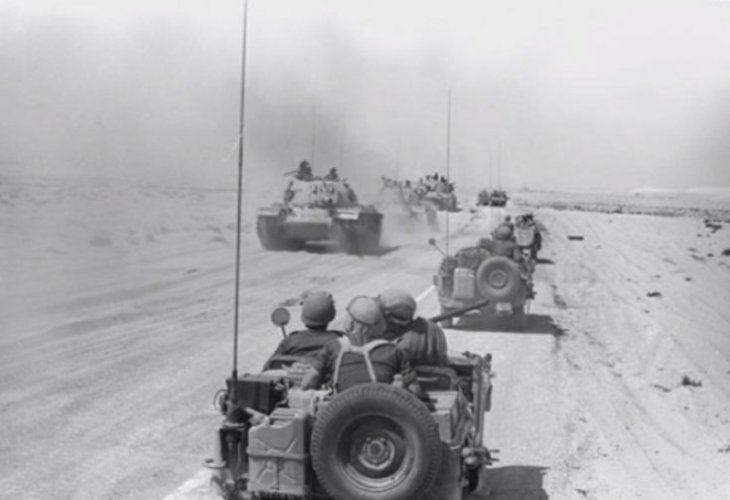Miracles in the Six-Day War: Unseen Forces at Play
The Six-Day War, spanning from May 26 to June 2, 1967, was fought between Israel and Egypt, Jordan, and Syria, with aid from Iraq, Saudi Arabia, Libya, Sudan, Tunisia, Morocco, and Algeria. Despite leadership failures, newly uncovered evidence suggests open miracles protected Israel.

The Six-Day War sparked immense pride and euphoria across Israel. "We won, and what a victory," exclaimed then-Chief of Military Intelligence, Major General Aharon Yariv. Yet, recently revealed recordings and testimonies highlight significant shortcomings that went unnoticed at the time: from intelligence lapses to leadership miscalculations, overshadowed by political agendas over military needs. It's now evident that the Israeli Defense Forces didn't deliver the miracles Israel experienced during that brief yet transformative conflict.
The Ministry of Defense's IDF Archives has released new testimonies pointing to widespread failures in IDF's preparedness, intelligence, and defense mechanisms.
Among the recordings is one of Major General Yariv revealing that during the war, Chief of Staff Yitzhak Rabin disagreed with the intelligence assessment that Egypt had no plans to attack Israel. "Intelligence suggested President Gamal Abdel Nasser of Egypt wasn't intending to strike Israel, yet Rabin found this assessment troubling. The logic didn’t sit right with him," Yariv stated.
In Yariv's written testimony to the History Unit, he explained how politics overshadowed military strategy. "The army was ready by May 25 or 26. We felt an interminable delay and took actions like sending the Mossad head to the US to speed things up. On June 6, military implications of the delay were presented to political leaders. The military urged against postponement, but the government decided to delay. The reasons were political, not military," he recounted.
Moshe Dayan's Reluctance to Capture the Old City
Yariv testified that Defense Minister Moshe Dayan initially opposed capturing Jerusalem's Old City. "The Defense Minister said - 'The Old City, let's just encircle it', due to its sacred sites and global implications. What led to the change? Likely developments on the ground," Yariv explained.
Yariv noted Dayan's orders not to reach the Suez Canal: "I instruct you - don't reach the canal, stop before it. Why? Simply because I don't want to," Dayan said. Regarding capturing the Golan Heights right before the war ended: "I got up to read reports and was told the Defense Minister was calling, he’s on the phone. He tells Dado - you can take a helicopter to the Golan."
The IDF archive project also uncovered testimonies from intelligence officers in divisions and brigades that fought in the war. These testimonies reveal significant errors in the intelligence shared with field units.
"There was no detailed information below brigade level, and often no precise location for artillery," one intelligence officer revealed. "We received critical information only the day before the operation," another officer described major intelligence failings.
"In the last two days, there were no reconnaissance flights, even as divisions carried out advance operations. Intelligence reports to the brigade were scant," another major reported.
The intelligence shortcomings were substantial. "There were no field operation kits or appropriate equipment. The head of the listening unit had to ask the Intelligence Officer to procure an antenna," one intelligence officer testified. "Intelligence reached the brigade late, sometimes 6-8 hours after departure. We had no information about the fortified, mined complex south of Mount Hermon. Not even hints about the possibility of such a complex. Aerial reconnaissance also faltered. The brigade received no alerts, hostage interrogators couldn’t extract significant data, and the reports failed to provide a clear picture of the enemy facing the brigade."
The testimonies further reveal that the Air Force did not function as required. "Apparently, the Air Force wasn’t operational at night. The enemy moved with lights on, and we missed 'taking them down'. There was also a shortage of fuel and ammunition," testified Major Yosef Meiner.
The Historic Command to Take the Old City
In July 1967, a month after the war, additional testimonies were collected. Major Uriya Akhmmon, intelligence officer of the 55th Brigade, testified that there was no intelligence material for Jerusalem. From his words, it appears that the city’s capture plan was very general, relying only on air photos and lacking ground knowledge.
"The general provided the choice to attack in darkness or wait for daylight for air support. The commanders' demand was to breach the city's line in the dark," Akhmmon said. This decision enabled almost casualty-free operation. "Each has their benchmark. After 95 were killed, speaking of one or two is almost none," he explained.
He portrayed the battle for Ammunition Hill and admired the Jordanian soldiers' fighting. "They fought determinedly—yes, officers or no officers—until subdued. Ammunition Hill was taken; they had no command, no communication, yet persisted in fighting. Their resilience left an impression on us, affecting how the Jordanian soldiers were treated subsequently—there were no killings, no mistreatment, nor revenge," he described.
Major Akhmmon recounted the command to liberate the Old City: "Motta (Motta Gur, then-commander of the 55th Brigade) issued the historic order over the radio. With no fighting underway, there was time for history, and he dramatically announced to all battalions the advance on the Old City."
The Six-Day War transpired over six days: from May 26 to June 2, 1967, between Israel and Egypt, Jordan, and Syria, aided by Iraq, Saudi Arabia, Libya, Sudan, Tunisia, Morocco, and Algeria. The war claimed 779 Israeli soldiers' lives, injured 2,593, and led to 15 captures. Nonetheless, the war conveyed to Israel's neighbors that the state was an unchangeable reality. Newly revealed data now show how the dominating sentiment of 'By our strength and power' once felt on the streets was misguided and just how much open miracles shielded young Israel from its surrounding foes.

